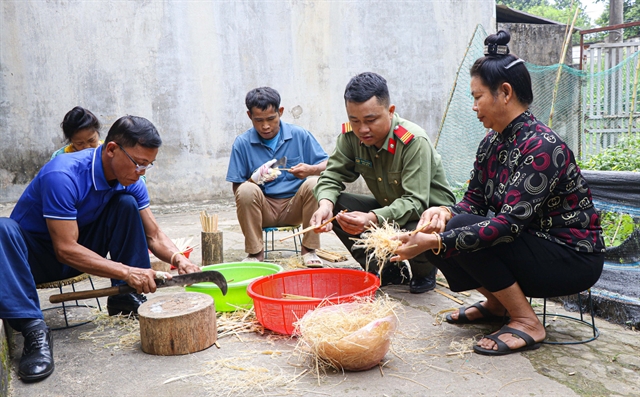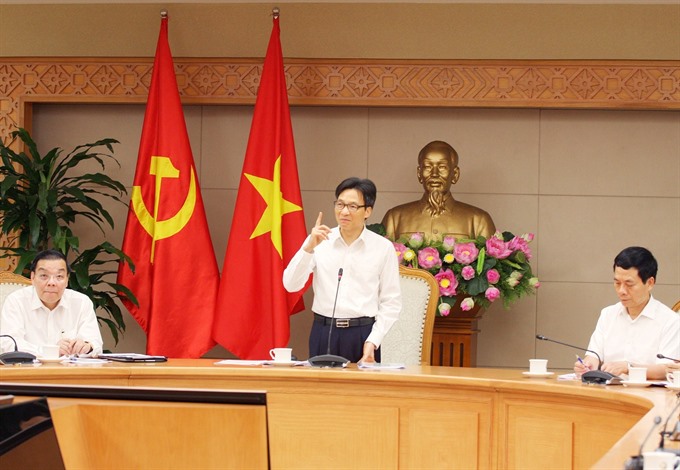 Society
Society

The Digital Vietnamese knowledge system, an ambitious Government funded open database similar to Wikipedia, now boasts more than 10,000 articles, alongside 3.5 million question and answers following its launch in January.
 |
| Deputy Prime Minister Vũ Đức Đam chairs the meeting by the Steering Committee for the Vietnamese digital knowledge system on May 17 in Hà Nội. — VNA/VNS Photo |
HÀ NỘI — The Digital Vietnamese knowledge system, an ambitious Government funded open database similar to Wikipedia, now boasts more than 10,000 articles, alongside 3.5 million question and answers following its launch in January.
Of the articles, 3,177 have been published in a ’tree of knowledge’ section, which gathers information on a range of subjects and publishes it for public use. Seven applications have also been made available on the website, including iOS apps and web based apps, which are subject specific, allowing users to search content according to their needs.
The steering committee of the database said 15 ministries and State agencies have compiled their ‘list’ of data to be made available on the system’s site (itrithuc.vn): The Ministry of Health contributed 8 GB of data, the Ministry of Education and Training contributed 2 TB of data, while the Việt Nam National University – Hà Nội contributed 10,000 entries, 15,000 Q&A entries and said another 15,000 are being prepared for publication.
A number of enterprises have made valuable contributions to the development of the knowledge hub, by uploading their e-books onto the site, as well as helping with data collection and conversion, translating several world-renowned encyclopedias into Vietnamese, or connecting the system to different social media platforms and IT forums.
Deputy Prime Minister Vũ Đức Đam, chairman of the Steering Comittee, said that there were already many projects and programmes on online databases, but most were disappointing.
The latest iteration, the Vietnamese digital knowledge system, is a major plan that aims to create a portal of fully localised knowledge in key fields, drawing the participation of several State agencies, enterprises, and organisations, alongside the public. The funding for the project comes mostly from taxpayer’s money.
Deputy PM Đam stressed that the success of the project can only be possible with the collective effort of the whole of society.
“We must spread a passion for science and technology, and light the innovative spirits of the whole of society. The project’s methodology must be logical, and science-based,” Đam urged.
“The project will help boost the development of science and technology, as well as innovation in the country, in a completely new way,” he said.
He also asked the three biggest telecom companies in Việt Nam – VNPT, Mobifone, and Viettel – to “actively and proactively participate in the development of the infrastructure and connectivity capacity of the project.”
The Deputy PM also called for special attention on the building of open learning materials to help teachers and students to better access quality knowledge.
“The vast number of documents stored at libraries, museums, and in the two in science academies in the country must be digitalised as soon as possible,” Đam said.
“All State agencies and local authorities have to be proactive in uploading data," he said, "Especially ministries such as education and health, whose data deals directly with the lives of everyday people."
During the meeting the Steering Committee also discussed the issue of copyright regarding uploaded data.
Professor Nguyễn Hữu Đức, vice rector of the Việt Nam National University – Hà Nội, said smoothing out copyright and patent-related issues will ease the concerns of scientists and researchers when they want to contribute their studies and findings to the open database.
“Currently, our university has received many scientific documents and research papers as voluntary contributions from senior scientists who demanded nothing in return. This is a valuable source of knowledge that we will continue to focus on collecting," Đức said.
The establishment of a ‘line in the sand’ between what information should be in the public domain and what should be kept within the respective organisations and agencies was also discussed at the meeting. Other topics of discussion included creating incentives to encourage contributions from organisations and individuals, and ways to promote the knowledge system to the public. — VNS